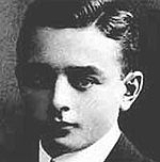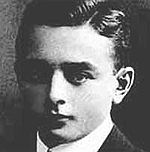
Georg Heym
Encyclopedia
Georg Heym was a German
writer. He is particularly known for his poetry, representative of early Expressionism
.

, Lower Silesia
in 1887 to Hermann and Jenny Heym. Throughout his short life, he was constantly in conflict with social conventions. His parents, members of the Wilhemine middle class, had trouble comprehending their son's rebellious behavior. Heym's own attitude towards his parents was paradoxical; on the one hand he held a deep affection for them, but on the other he strongly resisted any attempts to suppress his individuality and autonomy.
In 1900 the Heyms moved to Berlin
, and there Georg began unsuccessfully attending a series of different schools. Eventually, he arrived at the Friedrich-Wilhelms-Gymnasium at Neuruppin
in Brandenburg
. He was very unsatisfied, and as a way to achieve some release he began writing poetry. After he graduated and went to study law at Würzburg, he started writing plays as well. However, publishers largely ignored his work.
In 1910 Heym met the poet and writer Simon Guttmann, who invited Heym to join the recently founded Neue Club, a descendant of a student society at the University of Berlin. Other members of the Club included Kurt Hiller
, Jakob van Hoddis
, and Erwin Loewenson (also known as Golo Gangi). Often visiting were Else Lasker-Schüler, Gottfried Benn
, and Karl Kraus
. Although the Club had no actual stated objective, its members all shared a sense of rebellion against contemporary culture and possessed a desire for political and aesthetic upheaval. The Club held "Neopathetisches Cabaret" meetings in which members presented work, and it was here that Heym first gained notice. His poetry immediately attracted praise. In January 1911, Ernst Rowohlt
published Heym's first book and the only one to appear in his lifetime: Der ewige Tag.
Heym later went through several judicial jobs, none of which he held for long due to his lack of respect for authority. On 16 January 1912, Heym and his friend Ernst Balcke went on a skating trip to the frozen Havel. They never returned. A few days later their bodies were found. Appearances indicated that Balcke had fallen through the ice and Heym had attempted to save him but fell in as well. Heym remained alive for half an hour, calling out for help. His cries were heard by some nearby forestry workers, but they were unable to reach him.
Germany
Germany , officially the Federal Republic of Germany , is a federal parliamentary republic in Europe. The country consists of 16 states while the capital and largest city is Berlin. Germany covers an area of 357,021 km2 and has a largely temperate seasonal climate...
writer. He is particularly known for his poetry, representative of early Expressionism
Expressionism
Expressionism was a modernist movement, initially in poetry and painting, originating in Germany at the beginning of the 20th century. Its typical trait is to present the world solely from a subjective perspective, distorting it radically for emotional effect in order to evoke moods or ideas...
.

Life
Heym was born in HirschbergHirschberg
The German word Hirschberg is composed of Hirsch and Berg . It may refer to:* several places in Europe, including:** Hirschberg, Thuringia, Germany.** Hirschberg, Rhineland-Palatinate, Germany....
, Lower Silesia
Lower Silesia
Lower Silesia ; is the northwestern part of the historical and geographical region of Silesia; Upper Silesia is to the southeast.Throughout its history Lower Silesia has been under the control of the medieval Kingdom of Poland, the Kingdom of Bohemia and the Austrian Habsburg Monarchy from 1526...
in 1887 to Hermann and Jenny Heym. Throughout his short life, he was constantly in conflict with social conventions. His parents, members of the Wilhemine middle class, had trouble comprehending their son's rebellious behavior. Heym's own attitude towards his parents was paradoxical; on the one hand he held a deep affection for them, but on the other he strongly resisted any attempts to suppress his individuality and autonomy.
In 1900 the Heyms moved to Berlin
Berlin
Berlin is the capital city of Germany and is one of the 16 states of Germany. With a population of 3.45 million people, Berlin is Germany's largest city. It is the second most populous city proper and the seventh most populous urban area in the European Union...
, and there Georg began unsuccessfully attending a series of different schools. Eventually, he arrived at the Friedrich-Wilhelms-Gymnasium at Neuruppin
Neuruppin
Neuruppin is a town in Brandenburg, Germany. Located on the shore of Ruppiner See , it is the capital of the district of Ostprignitz-Ruppin. Population: 32,800 .-Overview:...
in Brandenburg
Brandenburg
Brandenburg is one of the sixteen federal-states of Germany. It lies in the east of the country and is one of the new federal states that were re-created in 1990 upon the reunification of the former West Germany and East Germany. The capital is Potsdam...
. He was very unsatisfied, and as a way to achieve some release he began writing poetry. After he graduated and went to study law at Würzburg, he started writing plays as well. However, publishers largely ignored his work.
In 1910 Heym met the poet and writer Simon Guttmann, who invited Heym to join the recently founded Neue Club, a descendant of a student society at the University of Berlin. Other members of the Club included Kurt Hiller
Kurt Hiller
Kurt Hiller also known as Keith Lurr and Klirr was a German essayist of high stylistic originality and a political journalist from a Jewish family. A socialist, he was deeply influenced by Immanuel Kant and Arthur Schopenhauer, despising the philosophy of G. W. F...
, Jakob van Hoddis
Jakob van Hoddis
Jakob van Hoddis was the pen name of a German-Jewish expressionist poet Hans Davidsohn, of which name "Van Hoddis" is an anagram...
, and Erwin Loewenson (also known as Golo Gangi). Often visiting were Else Lasker-Schüler, Gottfried Benn
Gottfried Benn
Gottfried Benn was a German essayist, novelist, and expressionist poet. A doctor of medicine, he became an early admirer, and later a critic, of the National Socialist revolution...
, and Karl Kraus
Karl Kraus
Karl Kraus was an Austrian writer and journalist, known as a satirist, essayist, aphorist, playwright and poet. He is regarded as one of the foremost German-language satirists of the 20th century, especially for his witty criticism of the press, German culture, and German and Austrian...
. Although the Club had no actual stated objective, its members all shared a sense of rebellion against contemporary culture and possessed a desire for political and aesthetic upheaval. The Club held "Neopathetisches Cabaret" meetings in which members presented work, and it was here that Heym first gained notice. His poetry immediately attracted praise. In January 1911, Ernst Rowohlt
Ernst Rowohlt
Ernst R. Rowohlt was a German publisher who founded the Rowohlt publishing house in 1908 and headed it and its successors until his death...
published Heym's first book and the only one to appear in his lifetime: Der ewige Tag.
Heym later went through several judicial jobs, none of which he held for long due to his lack of respect for authority. On 16 January 1912, Heym and his friend Ernst Balcke went on a skating trip to the frozen Havel. They never returned. A few days later their bodies were found. Appearances indicated that Balcke had fallen through the ice and Heym had attempted to save him but fell in as well. Heym remained alive for half an hour, calling out for help. His cries were heard by some nearby forestry workers, but they were unable to reach him.
Poetry
- Der Gott der Stadt (1910)
- Der ewige Tag (1911)
- Umbra vitae (1912)
- Marathon (1914)
External links
- Analysis of "Der Gott der Stadt" (German)

